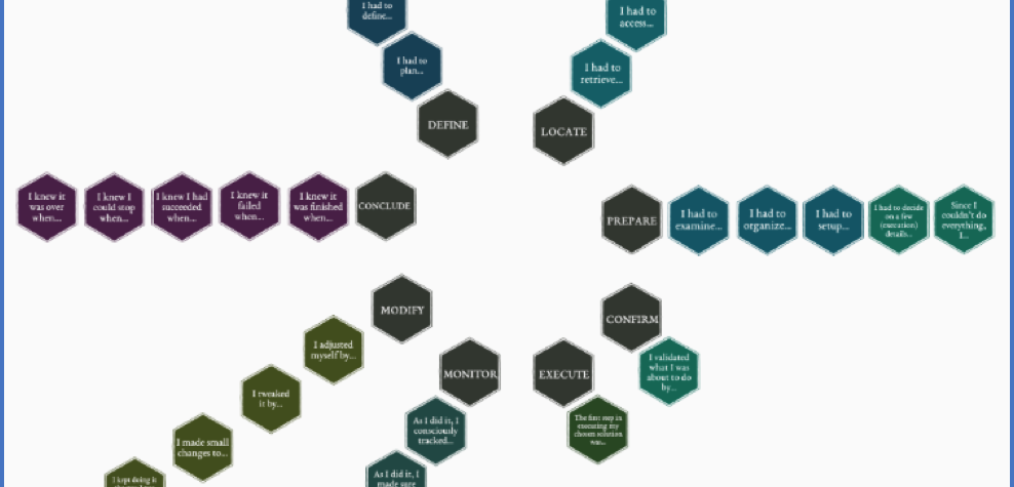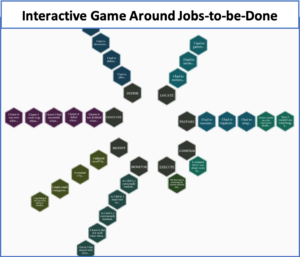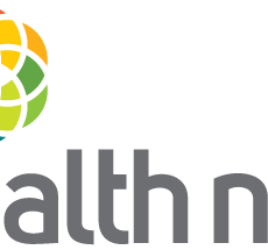
Better Choices, Better Health® BCBH Participant Research
By Katy Plant & Corina Paraschiv
More than three decades ago, the original Better Choices, Better Health®(BCBH) research team identified the important skills to develop for those self-managing chronic conditions. While these skills are consistent, the motivation for achieving healthy living goals, however, may vary greatly from one individual to another. So to better understand these varied motivations we reached out to our participants; we love hearing how Better Choices, Better Health® equips them with the tools they need to accomplish their goals and this time using strong research methodologies, we dove further into the “why” they endeavor to improve in the first place.
This summer, our team set out to better understand what drives participants toward fulfilling their healthier living goals. We brought on Corina Paraschiv, an expert in user centered design research, to assist us in our efforts. We selected a grounded theory approach, an interview analysis technique known for removing bias from the data. Through grounded theory, transcripts of 30 interviews we conducted were coded for recurrent themes. These codes were used as part of frequency analysis and correlations identification, to better understand the participant profiles and their respective healthy living goals, obstacles, and motivators.
Beyond physical indicators such as pain, the most frequently discussed themes in relations to healthy living changes were emotional in nature. These themes were seldom addressed by the solutions used to support health change, and thus represented obstacles in their attempts.
In the context of making healthy lifestyle changes:
- One in two participants mentioned a desire for a sense of agency, or control of their life.
- Two in three were struggling with feelings of helplessness.
- Two in three felt judged.
- Two in three felt misunderstood, either by society or their loved ones
- Nearly two thirds experienced shame and guilt around their chronic illness.
The desire for support was apparent throughout the stories shared with our team. One in two explicitly mentioned a desire for more support in their life as they work towards healthier living. One in four wanted accountability to help them reach their goals. This was compounded by the fact that four in ten of those we interviewed were battling the aftermath of childhood averse events or trauma as they embarked on a journey for healthy living. Yet, while there was a clear desire for social connections and support, 58% of those we interviewed actively battled a lack of support from their partner, family, and friends. When seeking the support of their physicians, one in five felt the doctor did not listen to their concerns, one in ten did not understand what their doctor was communicating, and one in five felt their doctor did not understand them.
Further Research Around Pain Management
 This Fall, we are taking a deeper dive into the motivations surrounding chronic pain, one of the most cited symptoms that our participants report. Our goal is to understand how we might better engage with (prospective) participants who are thinking about joining our program. In order to do so, we have planned a series of interviews with individuals new to the program. Through an interactive game, participants share with us the details of both successful and unsuccessful strategies, using a methodology in the field called jobs-to-be-done.
This Fall, we are taking a deeper dive into the motivations surrounding chronic pain, one of the most cited symptoms that our participants report. Our goal is to understand how we might better engage with (prospective) participants who are thinking about joining our program. In order to do so, we have planned a series of interviews with individuals new to the program. Through an interactive game, participants share with us the details of both successful and unsuccessful strategies, using a methodology in the field called jobs-to-be-done.
From our first round of interviews, we identified 38 key jobs related to pain management. From these, three key jobs were selected for a deeper dive with participants.
During the interview, participants will be invited to partake in two games, allowing us to break down the stages involved in planning, executing, and modifying their strategies related to pain management. Underlying these steps are desired outcomes, which we are then able to assess in relations to existing alternatives on the market. Using a quantitative survey based on the identified desired outcomes, we will be able to evaluate which highly valued outcomes are currently not being addressed by existing solutions, allowing us to both promote and reinforce the program around these key needs.
This type of field work is truly meaningful as it helps us directly exchange with participants, gathering insights and understanding from the experts on the topic: those who live with these conditions every day. We look forward to sharing our discoveries with you.


